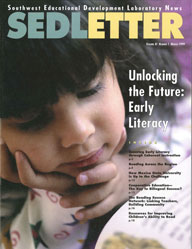New Mexico State University Is Up to the Challenge
Instead of planting apple seeds, I plant books," says Nick Dyorich, a co-coordinator for New Mexico State University's America Reads Challenge. Even more important, Dyorich plants tutors, who work one-on-one with children and adults struggling to learn to read throughout southern New Mexico communities.
Initiated in the fall of 1997, NMSU's College of Education, Department of Curriculum and Instruction, and the Office of Financial Aid have been working together to implement this literacy project, which employs Federal Work Study (FWS) students and volunteers of all ages. Joining the core of 30 federally paid students, who work 15-20 hours per week, are students from NMSU's Multicultural Education, Elementary Literacy and Early Childhood Literacy courses and community volunteers. All tutors receive training and material resources from the NMSU ARC Tutoring Program, which has developed three training manuals. Based on the latest in research findings as well as observations from tutors and clients, the manuals cover early childhood literacy, school literacy, and adult literacy.
"Dr. Stan Lopez has been the godfather of the program. He got it off the ground and kept it alive," Dyorich explains. But Lopez is also concerned about the survival of this important program, with or without continued funding, Dyorich notes. That concern led Lopez to approach regional high schools to participate in cross-age tutoring-enlisting the help of high school students to tutor elementary readers.

SEDL, along with the other nine regional labs, participated in the America Reads Challenge (ARC) program which used federal work-study students to tutor struggling readers. SEDL provided workshop training for tutors across the region and funded five Challenge sites located at Arkansas State University, New Orleans Reads!, New Mexico State University, Oklahoma City University, and Southwest Texas State University
"If we ever go away," says Lopez, referring to the NMSU America Reads Challenge model, "what we want to do is have something in place that goes on and on. We'd like to see it become part of the high school culture." He points out that our society does not value high school students enough, but they definitely have something to offer. "The little kids look up to them and they become involved-the older students become their heroes." Self-esteem increases for tutors and their young students, Lopez says, and drop-out rates decrease. Although there tends to be "initial discomfort" in using the high school students as tutors, the elementary schools in Las Cruces and Anthony with the cross-age tutoring programs are eager for more high-school volunteers.
Tutors work with struggling readers in a number of literacy enrichment activities that incorporate oral and written language. Of course the tutors read to and with the children and discuss the material they read, but they also spend time just talking to the children to determine their language capabilities and helping the young readers express themselves in speech. They write for and with the children, composing cards, lists, and stories and writing in diaries. The young readers spend time drawing and scribbling to help overcome their fear of writing, and they make personal alphabet books and piece together letter puzzles.
According to Dyorich, the model was designed to reach 200 students needing tutoring at Do–a Ana Branch Community College, the NMSU childhood development programs, Las Cruces Public Schools, and Gadsden Independent School District. The program quickly exceeded its goal of reaching 200 students in need of tutoring. The program now has approximately 500 tutors and more than double that number of students are being tutored. Dyorich and Lopez hope to create a network of satellite sites to reach even more youngsters and adults in Even Start, Head Start, public school, and adult literacy programs because the need is so great in border communities.
Dyorich regularly speaks to service clubs and community groups in search of more volunteers and seeks business donations for books and school supplies. FWS students and volunteers are trained by ARC coordinators, who also monitor their performance through field observations, tutor feedback, client-tutee feedback, and faculty input. Tutors are instructed in ways to "break the ice" with their young students, who give tutors tours of their schools and are encouraged to share their reading preferences and interests. "For many, the tutor becomes a constant for the child in an inconsistent life," he observes.
Next Article: Cooperative Education - The Key to Bilingual Success?

